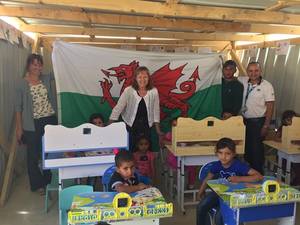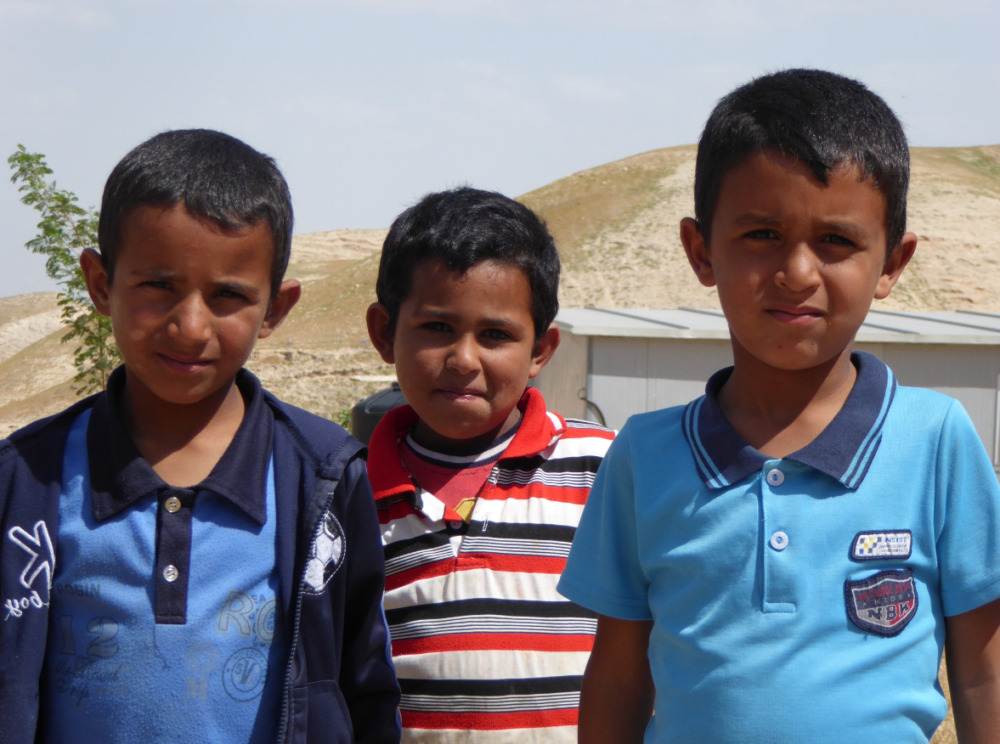Palestinian schools, including those supported by Welsh charities, are increasingly under threat in the occupied West Bank

Luke James
With its bare concrete floor, corrugated metal walls supported by wooden planks and a piece of cardboard in place of a blackboard, the nursery school in Sateh al Bahr wasn’t much to look at.
But this humble structure donated by the European Union represented hope for a better future for the dozen children of this small Bedouin community in Palestine’s occupied West Bank.
“There is no formal pre-school education and there are high levels of illiteracy among the Bedouins,” wrote Welsh football fan Tim Hartley in his book, The World at your Feet.
“This kindergarten is one of only a handful of self-help schools across the Jerusalem desert.”
Gôl!
Hartley visited the school as part of his work with the Gôl! Appeal, the charity established by Wales football supporters in 2002 to help underprivileged children in the countries they visit.
When Wales played against Israel in 2015, Gôl! organised a fundraising concert in Cardiff and used the proceeds to support a shelter for homeless young people in Tel Aviv as well as two pre-schools in the Palestinian territories.
The money raised by Welsh football fans paid for the cardboard to be replaced with a new whiteboard, as well as materials like copy books and felt tip pens.

Later that year, Welsh MEP Jill Evans visited the school as part of an international delegation to Palestine.
“When I visited, there was a big Welsh flag there and it was really heartening to see how the children there had been helped,” Evans told the BBC’s Sunday Supplement programme.
But just a year later the school had been dismantled by the Israeli authorities, which said it was illegally built in a military zone.
In a video published by the B’TSELEM human rights organisation, men wearing high-vis jackets can be seen removing chairs and desks from the school before taking it apart along with the homes of 26 residents.
“It’s horrible to think that gifts that were given freely by football fans were simply bulldozed out of existence,” Hartley told Nation.Cymru.
“This family and these children simply wanted to carry on their way of life, herding goats and sheep, making cheese to sell and to try and give their children an education. What can be wrong in that?”
The pre-school in Sateh al Bahr is one of an increasingly number of schools under threat in Area C of the West Bank, which is entirely administered by Israel and comprises 60% of the territory.
Only around one per cent of applications by Palestinians for building permits in Area C are successful, so most schools are considered illegal by the Israeli authorities.
Temporary structures
Aid agencies put up temporary structures, often in the middle of the night to avoid detection.
The Israeli authorities then issue a stop work or demolition order. Fifty five such orders were issues between 2013 and 2020, according to the United Nations. That comes to nine issued between 2002 and 2012.
Last year alone, 57 schools educating 6,550 children were under threat of demolition, according to the Norweigan Refugee Council.
Earlier this year, Israel issued a demolition order for a donor-funded school on January 24 – the United Nation’s International Day of Education.
That prompted fourteen governments, including that of the United Kingdom, to issue a joint statement calling on Israel to stop the demolition and others like it.
“Should the demolition go ahead, 39 Palestinian school children will be deprived of their basic right to education,” said the statement.
“The nearest alternative schools are approximately 5km away. Without adequate transport, students must make the long journey by foot, exposed to settler attacks, a heavily trafficked road and inclement weather.
“Under these conditions, girls and children with disabilities in particular are at a high risk of dropping out.”
Settlers
But even when schools are threatened by the Israeli authorities, they are still at risk from violence by settlers.
Attacks by settlers forced at least 1,539 Palestinians to flee their homes last year, according to the United Nations. That was twice as many as the previous year.
At least two schools were demolished in the communities that had to be abandoned, the UN reported.
One of the hot spots for settler violence was Nablus, where volunteers of the Gôl! Appeal also visited in 2015.
They made donations to a primary school in a nearby village which has since been caught up in the attacks.
“We were told that settlers would attack the little village,” said Hartley. “They would come down to burn the olive trees and then attack the Palestinians who were living there. There was stone throwing and attacks in this little village.
“It happened that the IDF came in then to placate things because obviously people were fighting back and tear gas was used in the village. That came into the school and the children had to be shepherded through the tear gas. They were desperately upset.
“The head told us some of these kids, weeks and months later, were still wetting the bed because of the nightmares they were having.”

The UK Government says Palestinian schools in Area C of the West Bank “remain vulnerable to settler violence.”
In December, settlers bulldozed a school in the village of Khirbet Zanuta which had been built with aid from European states, including the UK.
The families living in the village had already been forced to flee amid a surge in settler violence which followed the Hamas terror attacks of October 7.
Deplorable
Welsh Labour MP Wayne David, who is shadow minister for the Middle East, told Nation.Cymru the actions of settlers and the Israeli authorities in the West Bank are “deplorable.”
“Palestinians are being attacked and the Israeli security forces allow this to happen,” he said.
“It is disgraceful that schools are also being targeted and many of these schools are funded by the international community, including Welsh charities.
“The strongest condemnation of these attacks is needed. Israeli has a legal responsibility to protect the people who live in the land that is being occupied.”
Schools demolished or dismantled are often rebuilt by aid agencies in a cat and mouse game with the Israeli authorities.
That includes the pre-school in Sateh al Bahr, which is once again educating the youngest children of the communities’ 17 families.
That is crucial to the survival of this Bedouin community, according to Allegra Pacheco of the West Bank Protection Consortium which helped rebuild the school.
“Schools are one of the main anchors that keep Palestinian communities on their land,” she said.
“Without access to a nearby school, many Palestinian families would be forced to leave their land to allow their children to access an education.”
The threat of demolition will continue to hangover this school and others across the West Bank so long as Israel insists it is an illegal structure in a military zone.
But, for now, the threat of a bulldozer remains preferable to the bombardment taking place in Gaza.
The United Nations say that, of 563 of the school buildings in Gaza, 212 have received a direct hit and 53 have been “totally destroyed.”
Support our Nation today
For the price of a cup of coffee a month you can help us create an independent, not-for-profit, national news service for the people of Wales, by the people of Wales.






Ever since the Normans, the English Empire colonised Ireland, stealing land and exacerbating the effects of famine (see previous Nation.Cymru items).
The Irish Freedom Fighters fought their way to the table, to eventual secession in 1922, and are now a respected political party.
The Palestinians are in a similar position.